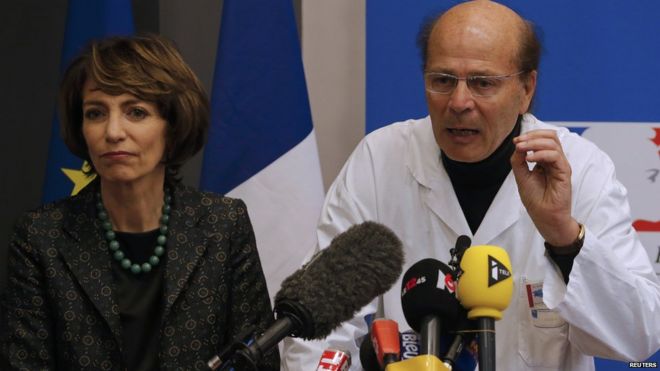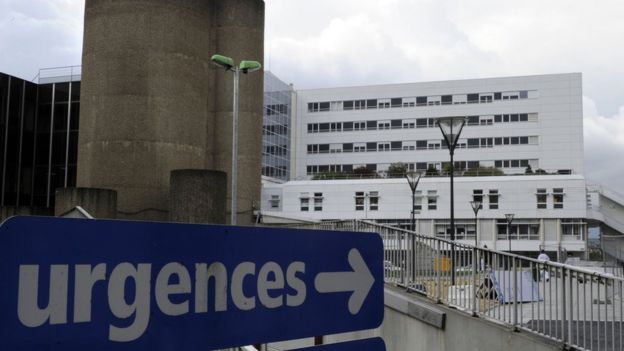
One man is brain-dead and another
five people are in hospital after an experimental drug was administered
to 90 people in a French clinical trial.
There is no known antidote to the drug, the chief neuroscientist at the hospital in Rennes said.Of the five men in hospital, three could have permanent brain damage, Gilles Edan added.
Reports that the drug is a cannabis-based painkiller have been denied by the health ministry.
The trial, which involved taking the drug orally and has now been suspended, was conducted by a private laboratory in Rennes.
The experimental drug was manufactured by the Portuguese company Bial.
All those who volunteered for the trial have been recalled and the Paris prosecutor's office has opened an investigation.
Health Minister Marisol Touraine pledged to "get to the bottom... of this tragic accident".
"I was overwhelmed by their distress" she told reporters. "Their lives have been brutally turned upside down".
Analysis
By James Gallagher, health editor, BBC News websiteThis is the bitter price of the new medicines we take for granted. Testing such experimental drugs, at the cutting edge of science, can never be completely risk-free.
The safety and effectiveness of these drugs are rigorously tested in animals. The risks are low but there must still be a leap of faith when they are tried in people for the first time.
This trial has been taking place since July without such major events being reported. Generally in Phase I trials the dose is increased slowly over time, which could be why the side-effects are appearing now.
The hospitalised men started taking the drug regularly on 7 January and began showing severe side-effects three days later.
Three of the volunteers are now facing a lifetime of disability in this "accident of exceptional gravity".
It is a high price to pay, but thousands of people do safely take part in similar trials each year.
The trial was conducted by Biotrial, a French-based company with an international reputation which has carried out thousands of trials since it was set up in 1989.
In a message on its website, the company said that "serious adverse events related to the test drug" had occurred.
The company insisted that "international regulations and Biotrial's procedures were followed at every stage".
According to the health ministry, the adverse effects occurred on Thursday.
Clinical trials
Trials typically have three phases to assess a new medicine for safety and effectiveness- Phase I tests for safety. A small number of people, sometimes healthy, and sometimes with a medical condition, are given a tiny dose of the drug under careful supervision, not to test if the drug works, but in order to check for any side effects
- Phase II sees the drug given to people who have a medical condition to see if it does indeed help them
- Phase III trials are only for medicines or devices that have already passed the first two stages, and involve them being compared to existing treatments or a placebo. The trials often last a year or more, involving several thousand patients
German medics challenge new EU clinical drug trials
Why some new drugs cost so much
The study was a Phase I clinical trial, in which healthy volunteers take the medication to evaluate the safety of its use, the ministry said.
Before any new medicine can be given to patients, detailed information about how it works and how safe it is must be collected.

Every year around the world thousands of people take part in clinical trials but incidents like this are very rare, the BBC's Hugh Schofield reports from Paris.
New EU regulations to speed up clinical drug trials and streamline testing procedures across the 28-nation bloc are due to take effect in 2018.
BBC.
YEMI.


0 comments:
Post a Comment